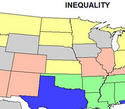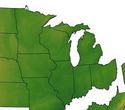We earlier mapped inequality of the US states. Now I show the geography of inequality for metropolitan areas over 1,000,000. These measures of inequality are gini coefficients, calculated by the US Census Bureau for 2005-2009. These indicate how amazingly severe inequality, or the concentration of income and wealth at the top, has become. The gini is a measure of the departure of a curve of accumulated income, ranking from the poorest to the richest. read more »
Demographics
Inequality of the Largest U.S. Metropolitan Areas
- Login to post comments
Book Review: 'The End of the Suburbs,' by Leigh Gallagher
Suburbia has been a favorite whipping boy of urbane intellectuals, who have foretold its decline for decades. Leigh Gallagher's "The End of the Suburbs" is the latest addition to this tired but tireless genre. The book lacks the sparkling prose and original insights one could find in the works of, say, Jane Jacobs or Lewis Mumford. Indeed, Ms. Gallagher's book is little more than a distillation of the conventional wisdom that prevails at Sunday brunch in Manhattan.
The author restages many of the old anti-suburban claims, and her introduction's section headings easily give away the gist of the argument: "Millennials hate the burbs"; "Our households are shrinking"; "We are eco-obsessed"; "The suburbs are poorly designed to begin with"; and so on. read more »
Americans' Family Feud
In this bizarrely politicized environment, even the preservation of the most basic institution of society – the family – is morphing into a divisive partisan issue. Increasingly, the two parties are divided not only along lines of economic and social philosophy, but over the primacy of traditional familialism. read more »
Suburb Hating is Anti-Child
Sure, suburbs have big problems. Their designs force their inhabitants to drive in cars, instead of walking and bicycling. This diminishes face-to-face interactions, physical health, and the quality of the environment. Aesthetically, many of them, particularly those dreaded “planned communities,” are quite boring. People who live there tend not to have much contact with people who aren’t like them, so suburbs reinforce racial, religious, and class segregation. read more »
A Map Of America's Future: Where Growth Will Be Over The Next Decade
The world’s biggest and most dynamic economy derives its strength and resilience from its geographic diversity. Economically, at least, America is not a single country. It is a collection of seven nations and three quasi-independent city-states, each with its own tastes, proclivities, resources and problems. These nations compete with one another – the Great Lakes loses factories to the Southeast, and talent flees the brutal winters and high taxes of the city-state New York for gentler climes – but, more important, they develop synergies, albeit unintentionally. read more »
The Emerging Geography of Inequality
Since the 1970s there has been a well-documented and persistent increase in income inequality in the United States. As the country slowly emerges out of a deep recession, it is instructive to seek out the geographic variation by states in the degree of inequality and the variation in both median and mean incomes. read more »
Swedish Lessons for Obama
During his upcoming visit to Sweden, President Barack Obama will surely praise the nation’s combination of high living standards, few social problems, and high level of income equality. What he may not recognize -- although he should -- is that the astonishing social and economic outcomes in Sweden and other Nordic countries have more to do with a unique culture among homogenous populations than with simply following a recipe of social democratic policies. read more »
Southern California's Road Back
If the prospects for the United States remain relatively bright – despite two failed administrations – how about Southern California? Once a region that epitomized our country's promise, the area still maintains enormous competitive advantages, if it ever gathers the wits to take advantage of them. read more »
South Korea, What Will Limit the World’s Global Underdog?
South Korea is a small country with grit. The shrimp sized peninsula is a national success story that transformed itself from impoverished conditions to industrial riches in a remarkable 68-year postwar period. The country experienced the fastest growth in per-capita GDP since the 1960. read more »
Rust Belt Chic And The Keys To Reviving The Great Lakes
Over four decades, the Great Lakes states have been the sad sack of American geography. This perception has been reinforced by Detroit’s bankruptcy filing and the descent of Chicago, the region’s poster child for gentrification, toward insolvency. read more »






















